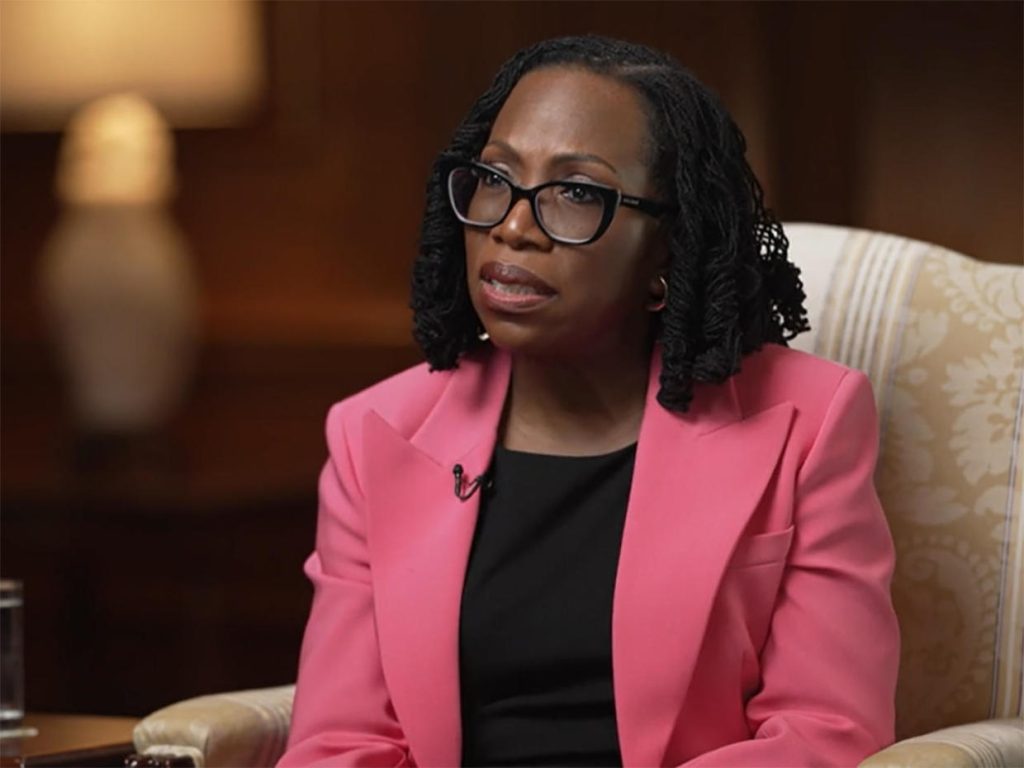WASHINGTON — Justice Ketanji Brown Jackson said she does not “have any problem” with an enforceable ethics code for the Supreme Court, as the nation’s highest court continues to face questions over its ethics practices amid calls from Democrats for stricter rules.
In an interview with “CBS Evening News” anchor and managing editor Norah O’Donnell for “CBS Sunday Morning,” Jackson suggested she is open to a means of enforcing the code of conduct issued by the Supreme Court in November 2023.
“I am considering supporting it as a general matter,” she told O’Donnell of an enforcement mechanism. “I’m not going to get into commenting on particular policy proposals. But from my perspective, I don’t have any problem with an enforceable code.”
Jackson’s remarks were made during her first broadcast interview since she joined the court in June 2022. She is the first Black female justice. The interview came ahead of the release of her memoir, “Lovely One.”
Jackson said a binding ethics code is “pretty standard” for judges on the nation’s district and appeals courts. Federal judges have been subject to a code of conduct since 1973, but it does not cover Supreme Court justices. The court, for the first time in its history, implemented its own conduct code last November after years of weighing whether to have one, but it does not contain an enforcement mechanism.
Jackson noted that she was bound by an enforceable code during her time on the lower courts.
“And so I guess the question is, ‘Is the Supreme Court any different?’ And I guess I have not seen a persuasive reason as to why the court is different than the other courts,” she said.
Ethics at the Supreme Court
Over the last 16 months, the Supreme Court has come under scrutiny from Congress over its ethics practices, driven by a series of articles from the investigative news outlet ProPublica about Justice Clarence Thomas’ relationship with Harlan Crow, a Texas real estate developer and billionaire Republican donor.
ProPublica found that Thomas accepted luxury vacations from Crow and traveled aboard his private jet and yacht during his tenure on the Supreme Court, trips that were not included on his annual financial disclosure forms.
Thomas said last year that he did not believe he had to list the trips, since he had been advised they were considered personal hospitality from a close friend and therefore not reportable under the rules at the time. Disclosure guidelines were changed last March by the Judicial Conference, the policy-making body of the federal judiciary, and the justice pledged to comply with the new requirements.
In his 2023 financial disclosure report, Thomas listed trips aboard Crow’s private jet and a stay at his property in the Adirondacks, and reported a 2014 real estate transaction with the Republican megadonor. His most recent disclosure form, released to the public in June, included an amendment listing two trips taken with Crow in 2019: to Bali and Monte Rio, California.
Still, Democratic senators investigating Thomas’ compliance with ethics policies said they uncovered even more undisclosed travel, including three trips the justice took on Crow’s private jet between 2017 and 2021 and a roundtrip flight from Hawaii to New Zealand in November 2010.
Justice Samuel Alito has also faced criticism for a fishing trip taken with a wealthy Republican donor in 2008 and for two flags flown outside his Virginia home and New Jersey vacation house. Both kinds of flags — an upside-down American flag and “Appeal to Heaven” flag — were carried by rioters who breached the U.S. Capitol building on Jan. 6, 2021.
Alito maintained that he was not involved in the flying of the flags and did not know their meaning. He rejected calls to recuse himself from cases before the court related to Jan. 6.
For her part, Jackson reported receiving four concert tickets from singer Beyoncé, valued at $3,711, and artwork for her chambers worth $10,000 and $2,500 in 2023. She also disclosed receiving congratulatory flowers from Oprah Winfrey valued at $1,200, a designer dress and jacket worn in a Vogue photo shoot worth $6,580 and a $580 painting in 2022, the year Jackson joined the Supreme Court. The reporting of the gifts was in compliance with federal ethics rules that require judges to list information on items they receive that are valued at $480 or more.
Jackson told O’Donnell that she believes it’s important to follow the rules regarding ethical obligations because it ensures the public can trust that judges are being impartial when hearing and deciding cases.
“It really boils down to impartiality. That’s what the rules are about,” she said. “People are entitled to know if you’re accepting gifts as a judge so that they can evaluate whether or not your opinions are impartial. And I think that’s sort of standard in the law.”


